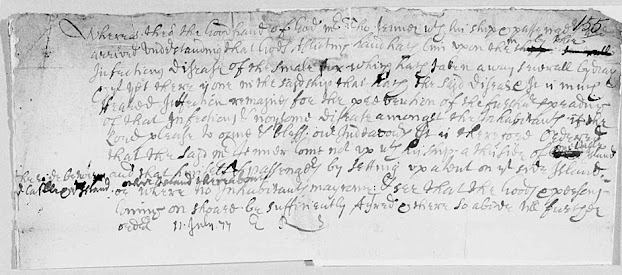In 1677 the town of Boston was besieged by one of the worst smallpox epidemics in its history. At that time Castle Island was the site where incoming vessels stopped to declare their customs duties and let the Captain of the Island, at that Edward Rawson, about any infection on board ship. Two remarkable letters have recently been discovered that discuss the quarantine of infected vessels that arrived during the summer of 1677. One was commanded by Captain Legg and the other by Captain Semmor - possibly a deviant spelling of Seymour.
Captain Legg was ordered to quarantine on Deer Island as the following transcript of Rawson's order reveals. Special dispensation was allowed for pregnant woman who was near her time of delivery. An image of that letter is also shown below in the handwriting of Edward Rawson (his initials are evident at the bottom of the order).
"Ordered that for prevention of infection by any of the passengers in Mr. Legg’s Ship that has by the hand of God been visited by smallpox that no passengers be permitted to come ashore in Boston or any neighboring town and they can come ashore on the island [known] as Deer Island and praying mercifully to remain on penalty of forfeiting ninety pounds a passenger for any so doing only the woman near her time yet has liberty to come on shore on any island or to prescribe for herself when she best may accommodate herself as to receive and then [for] assistance."
 |
| Edward Rawson Quarantine Order to Stand Down to Deer Island: 1677 |
That same summer, Edward Rawson quarantined another vessel ordering it to anchor on the rear side of Castle Island or any uninhabitated island in Boston Harbor in order to avoid spreading the smallpox infection to those living in Boston. While some of the words in the order are hard to decipher the transcript of the letter below provides the gist of the order.
"Whereas by the good hand of God, Master Thomas Semmor, with
his ship and passengers have arrived and understanding that God’s afflicting hand
has come upon them by infecting disease of the smallpox, which has taken away
several by day. Of yet where some of the said ship that have the said disease
may please suffer them to remain so the retribution of the further spreading of
that infection and noisome disease amongst the inhabitants, if the lord pleases
us and blesses our industry (?) as to remove: ordered that the said Mr. Semmor
come not up with his ship, at this ship side of Castle Island, the side behind
that run said passengers by getting up about on ye said island of Castle Island,
or other island thereabouts, where no inhabitants may reside and see that the
good expenses coming on shore be sufficiently assured and where so above be
further ordered."
11 July [16]77 E.
Rawson

Edward Rawson Orders Captain Semmor to Quarantine on baord ship or an uninhabitted island: 1677
Hundreds of Bostonians, and those living in nearby towns, died from the smallpox epidemic of 1677. It was a unique event in the history of American epidemics in that the quarantine actions taken were not supported by any quarantine laws - merely orders given by Captain Edward Rawson working under the direction of Governor Josiah Winslow and his Assistants.
While Governor Winslow is best known for presiding over King Philip's War that raged from 1675 to 1678, his guidance and support for the work of Edward Rawson during the smallpox epidemic of 1677 is one of the first American examples of denying immigrants and aliens entrance into the United States. It would take another 206 years before President McKinley would formalize these draconian policies by prohibiting immigrants with cholera from entering United States ports in 1983. Desperate times lead to desperate measures and this was the state of affairs in Boston Harbor during the summer of 1677 when nearly one thousand souls died from smallpox.
Source: Letters of Edward Rawson, Massachusetts State Archives, Maritime 1671-1694, edited by Office of the Secretary of the Commonwealth, Boston, Massachusetts Archive Collection, 1677, vol, 61, pp, 155, 166.
